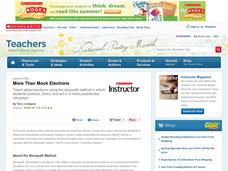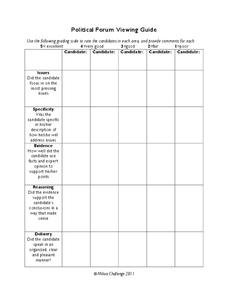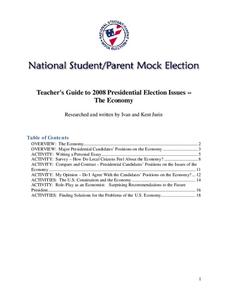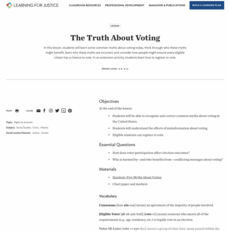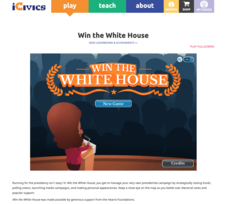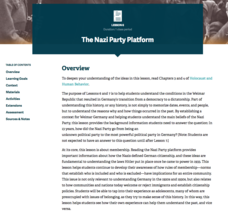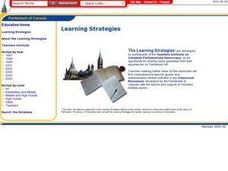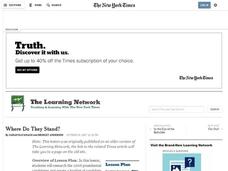Curated OER
Registering to Vote
Eighth graders register to vote. In this registration lesson, 8th graders complete the first step of the voting process by completing a form. Students use this lesson to prepare for a mock election. The lesson is part of a unit.
Encyclopedia Britannica
Becoming US President
It's that time of year, and the year. Once again the race is on for the White House. It's important that young voters, and would-be voters, understand the process for becoming the United States President. Class members research the...
Curated OER
More Than Mock Elections
Students create a presidential campaign story. In this presidential campaign lesson, students produce, direct and act in their own campaign story. Stories focus on setting, characters, context, critical incidents, and concluding events.
Curated OER
Election 2005: Campaign Issues
Learners take a closer look at the election of 2005. In this British politics instructional activity, students listen to a lecture about the 2005 campaign and active citizenship. Learners then create collages and news boards about the...
Curated OER
Election of 1860
Young scholars determine how the presidential election of 1860 led to the American Civil War. In this election of 1860 lesson, students discover details regarding the election and hold their own mock debate and election. Young scholars...
Curated OER
The Times, Are They A-Changing?
Students read and discuss article, "We Agreed to Agree, and Forgot to Notice," participate in anonymous mock presidential primary ballot, and share reactions to Iowa caucus results. Students then collect statements made by candidates on...
Annenberg Foundation
Student Voices
Whether it's an election year or not, a unit on voting patterns and political campaigns will awaken the civic pride in your high school citizens. Divided into six parts, the curriculum covers various facets of an election, including...
Mikva Challenge
Political Forum Viewing Guide
Is there a way to determine a winner of a political debate? Use a helpful rubric to evaluate the issues, specificity, evidence, reasoning, and delivery of candidates in a debate. After assessing each person's performance, high schoolers...
Curated OER
Teacher's Guide to 2008 Presidential Election Issues: The Economy
Students discuss the 2008 Presidential election. They examine the significant issues of the election and focus on the economy. Students study the major issues with the economy. Students decide how they feel about each canidates' views...
Teaching Tolerance
The Truth About Voting
True or False: Only Presidential elections matter. Academics delve into common voting myths to understand what is true and why the election process is critical to democracy. The lesson uses group discussion, activities, and handouts to...
Curated OER
YOUR OWN CAMPAIGN
Twelfth graders, in groups propose a new law and design a campaign to get people to vote for their law. They have a voter's forum and hold a mock election.
Curated OER
Electronic Elections
Learners evaluate the role of voting in democratic societies and the potential of voting on the Internet.
Curated OER
Citizens of the Future
Young sociologists explore how local, state, and federal governments work. This very impressive and ambitious lesson requires pupils to contact government officials who represent them and their families. They research elections, and hold...
Curated OER
Donkeys and Elephants and Voters, Oh My!
Students celebrate party politics. In this American politics lesson, students discover what the 2 main political parties in the country are and discuss their functions. Students then participate in a classroom simulation that requires...
Constitutional Rights Foundation
Winner-Take-All: The Two-Party System
Two's company, three's a crowd. High school historians learn about the Electoral College, a two-party, winner-take-all voting system in the United States. The instructional activity explains the pros and cons of the two-party system,...
iCivics
Win the White House
What does it take to win the White House? A video game allows young political operatives to try their hand at winning 1600 Pennsylvania Avenue by deciding on key issues, where and how to spend campaign dollars, and the role of polling...
Curated OER
Ballots
In this history worksheet, students utilize individual ballots to vote in a mock election/classroom election throughout the year as needed.
Facing History and Ourselves
The Nazi Party Platform
Not all party platforms stay democratic. A resource covers many political issues in Germany during the time of World War II, and teaches pupils about the Nazi party platform and what went wrong. Individuals participate in a warm-up...
Curated OER
Exercising the Franchise! The Right to Vote
Pupils research Canadian election procedures, identify candidates and corresponding political platforms for current elections and hold mock elections. They develop a written report about a specific political party.
Curated OER
Results In On Mock Election
Students examine the two presidential candidates in 2000, and identify their own stance on campaign issues. They create fictional candidates that represent their beliefs, and write campaign speeches from their point of view.
Curated OER
The Voting Game
Young scholars examine and discuss the Canadian electoral process. They conduct a simulation of the electoral process, with students running as candidates, holding a convention, campaigning, and voting for Prime Minister of the Day.
Curated OER
A Tale of Two Wars
Young scholars create Venn diagrams comparing and contrasting the Vietnam and Iraq wars. They write informed letters to their senators expressing their opinions and possible solutions to the war. They also create mock bumper stickers...
Curated OER
Where Do They Stand?
In this presidential election worksheet, students research the 2008 presidential candidates and create a booklet of candidate profiles that clearly differentiate each one. They also assume the identity of one of the candidates and hold a...
Curated OER
The Great Debate
Students watch tapes of televised presidential debates dating from 1960. They analyze debates and participate in mock debates.




